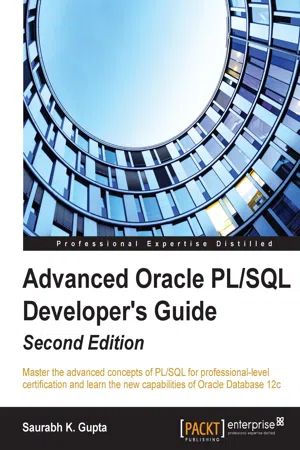
- 428 pages
- English
- ePUB (mobile friendly)
- Available on iOS & Android
Advanced Oracle PL/SQL Developer's Guide - Second Edition
About this book
Master the advanced concepts of PL/SQL for professional-level certification and learn the new capabilities of Oracle Database 12cAbout This Book• Learn advanced application development features of Oracle Database 12c and prepare for the 1Z0-146 examination• Build robust and secure applications in Oracle PL/SQL using the best practices• Packed with feature demonstrations and illustrations that will help you learn and understand the enhanced capabilities of Oracle Database 12cWho This Book Is ForThis book is for Oracle developers responsible for database management. Readers are expected to have basic knowledge of Oracle Database and the fundamentals of PL/SQL programming. Certification aspirants can use this book to prepare for 1Z0-146 examination in order to be an Oracle Certified Professional in Advanced PL/SQL.What You Will Learn• Learn and understand the key SQL and PL/SQL features of Oracle Database 12c• Understand the new Multitenant architecture and Database In-Memory option of Oracle Database 12c• Know more about the advanced concepts of the Oracle PL/SQL language such as external procedures, securing data using Virtual Private Database (VPD), SecureFiles, and PL/SQL code tracing and profiling• Implement Virtual Private Databases to prevent unauthorized data access• Trace, analyze, profile, and debug PL/SQL code while developing database applications• Integrate the new application development features of Oracle Database 12c with the current concepts• Discover techniques to analyze and maintain PL/SQL code• Get acquainted with the best practices of writing PL/SQL code and develop secure applicationsIn DetailOracle Database is one of the most popular databases and allows users to make efficient use of their resources and to enhance service levels while reducing the IT costs incurred. Oracle Database is sometimes compared with Microsoft SQL Server, however, Oracle Database clearly supersedes SQL server in terms of high availability and addressing planned and unplanned downtime. Oracle PL/SQL provides a rich platform for application developers to code and build scalable database applications and introduces multiple new features and enhancements to improve development experience.Advanced Oracle PL/SQL Developer's Guide, Second Edition is a handy technical reference for seasoned professionals in the database development space. This book starts with a refresher of fundamental concepts of PL/SQL, such as anonymous block, subprograms, and exceptions, and prepares you for the upcoming advanced concepts. The next chapter introduces you to the new features of Oracle Database 12c, not limited to PL/SQL. In this chapter, you will understand some of the most talked about features such as Multitenant and Database In-Memory. Moving forward, each chapter introduces advanced concepts with the help of demonstrations, and provides you with the latest update from Oracle Database 12c context. This helps you to visualize the pre- and post-applications of a feature over the database releases. By the end of this book, you will have become an expert in PL/SQL programming and will be able to implement advanced concepts of PL/SQL for efficient management of Oracle Database.Style and approach The book follows the structure of the Oracle Certification examination but doesn't restrict itself to the exam objectives. Advanced concepts have been explained in an easy-to-understand style, supported with feature demonstrations and case illustrations.
Tools to learn more effectively

Saving Books

Keyword Search

Annotating Text

Listen to it instead
Information
Advanced Oracle PL/SQL Developer's Guide Second Edition
Table of Contents
Table of contents
- Advanced Oracle PL/SQL Developer's Guide Second Edition
Frequently asked questions
- Essential is ideal for learners and professionals who enjoy exploring a wide range of subjects. Access the Essential Library with 800,000+ trusted titles and best-sellers across business, personal growth, and the humanities. Includes unlimited reading time and Standard Read Aloud voice.
- Complete: Perfect for advanced learners and researchers needing full, unrestricted access. Unlock 1.4M+ books across hundreds of subjects, including academic and specialized titles. The Complete Plan also includes advanced features like Premium Read Aloud and Research Assistant.
Please note we cannot support devices running on iOS 13 and Android 7 or earlier. Learn more about using the app